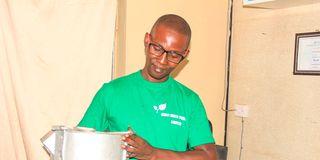Novel model for refugee energy crisis is worth it

Connecting displaced people with clean, affordable energy is an urgent humanitarian challenge. In refugee camps, the share of residents without electricity and safe cooking methods can be even 90 per cent.
Powering up communities supports displaced people to stay safe and healthy, earn a living, learn and stay in touch with loved ones. But there are many barriers—including a lack of public and private investment, and officials’ reluctance to sanction infrastructure that ‘settles’ displaced people.
Every day in the Global South, businesses and non-profits use mini-grids and rooftop solar to bring clean energy to more communities as safer cookstoves tackle deforestation and air pollution. But barriers often stop their spread to displaced people. We risk a widening energy poverty gap.
How can this gap be closed? A key step is supporting and replicating homegrown energy initiatives, and the entrepreneurs and community organisations driving ground-up change.
They know the solutions and the funding and the business models. Support is needed for more inclusive, participatory, sustainable humanitarian system. Having energy systems locally owned or run hand-in-hand with local people is a foundation for resilience. Crucially, it helps bring dignity back to communities.
Truly homegrown innovation include Usafi Green—a refugee-led enterprise in Kakuma Refugee Camp manufacturing 2,000 cookstoves a month and the clean-burning briquettes to fuel them. With 95 per cent of its staff under 35, it has a huge impact on youth unemployment.
Save the Environment Ethiopia has launched 12 clean energy co-operatives in partnership with UNHCR, local authorities and funder IKEA Foundation. Locals are trained, supporting livelihoods such as farming to gum and incense making.
Nigeria’s Care for Social Welfare International (Caswi) is helping displaced people to make the most of their 350-hectare land in Cross River State. A solar-powered borehole helps 1,200 farmers to irrigates fields, with 50 households taking up fish pond farming. Farmers process and sell produce.
In Cameroon, Hope for a Better Future is empowering women from the internally displaced and host communities to run ‘solar solution centres’ in Northwest Region. The start-up kits and technical and business training help the women to supply and repair solar lamps and clean cookstoves and process farm goods using a solar dryer. It also promotes their products through community events.
Communities can drive forward energy access. But international organisations can catalyse and de-risk markets in humanitarian settings to allow homegrown initiatives. They can create impact as partners, funders or customers of grassroots efforts.
Clean energy can be a foundation for a better life and also new ways of thinking and acting in the humanitarian system, sparking progress in the world.
Ms Nashwa (@nashwa_naushad) is a programme officer at Ashden. Mr Alkayed (@ameralkayed) is co-founder and chairperson of Global Refugee-Led Network.




